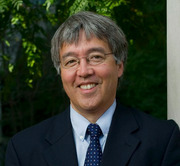Serving the CISE Community and Beyond

 In this issue of CRN, you’ll notice that the National Science Foundation (NSF) Directorate for Computer and Information Science and Engineering (CISE) has posted a job announcement search for the Division Director for the Division of Computer and Network Systems (CNS). I want to not only call your attention to this search, but also to point out the many opportunities to serve our discipline, and more broadly the Nation, in various ways through time-limited positions throughout the government.
In this issue of CRN, you’ll notice that the National Science Foundation (NSF) Directorate for Computer and Information Science and Engineering (CISE) has posted a job announcement search for the Division Director for the Division of Computer and Network Systems (CNS). I want to not only call your attention to this search, but also to point out the many opportunities to serve our discipline, and more broadly the Nation, in various ways through time-limited positions throughout the government.
Here in NSF CISE, roughly half of our program staff (program directors and division directors) are “rotators” – faculty from academia and researchers from industry who spend between two and four years working at NSF. The position I am serving in – Assistant Director – is also a rotator position, and like many such rotator positions, it is made possible through the Intergovernmental Personnel Act (IPA).
Opportunities to work as a Program Officer within CISE are noted on our homepage. You might want to check out a video by Keith Marzullo, our outgoing CNS Division Director, who reflects on his experience as a rotator, and also read the 2011 CRN article by Doug Fisher, a CS professor at Vanderbilt, who reflected on his time as a CISE Program Director several years ago. The possibility of taking a few years away from one’s home department is often eased by the availability of the NSF’s Independent Research/Development (IR/D) program, which permits rotators to spend time back at their home institutions and maintain involvement with their ongoing research activities.
There are other opportunities to serve in CISE as well. At NSF, we engage experts for focused, short-term assignments. We’ve also been incredibly fortunate to have a number of amazingly talented AAAS Science & Technology Policy Fellows who work closely with CISE permanent and IPA staff on focused one- or two-year activities. Erwin Gianchandani, our CISE Acting Deputy Assistant Director, is a former AAAS Fellow.
There are also a number of opportunities to serve at other Federal agencies. The Institute of Electrical and Electronics Engineers (IEEE) supports several Government Fellowships; Scott Jordan, currently the Federal Communications Commission (FCC) CTO (and a faculty member at UC Irvine) was an IEEE Congressional Fellow. The National Academies sponsors the Jefferson Science Fellowship Program; Margaret Martonosi of Princeton’s CS Department is at the U.S. State Department as one of this year’s Jefferson Fellows, and is a CRA Board member. Stephanie Forrest of U. New Mexico’s CS Department was a Jefferson Fellow there a year ago and is also a CRA Board member; you can read about her work there on the CCC blog. The past three Chief Technologists of the Federal Trade Commission and the past CTO of the FCC are also all computer scientists who’ve taken time from their academic positions to serve the community and the country.
After just nine months here, it’s very clear to me that the combination of permanent and rotating staff makes for an energizing and dynamic mix of experience and stability, with a constant flow of ideas and people. My own experience, and that of everyone I know who has spent time here at NSF, is that our work here is interesting, 100% engaging, and very deeply satisfying and rewarding. The environment is filled with smart, passionate and dedicated people – what more could one want in a work environment!







